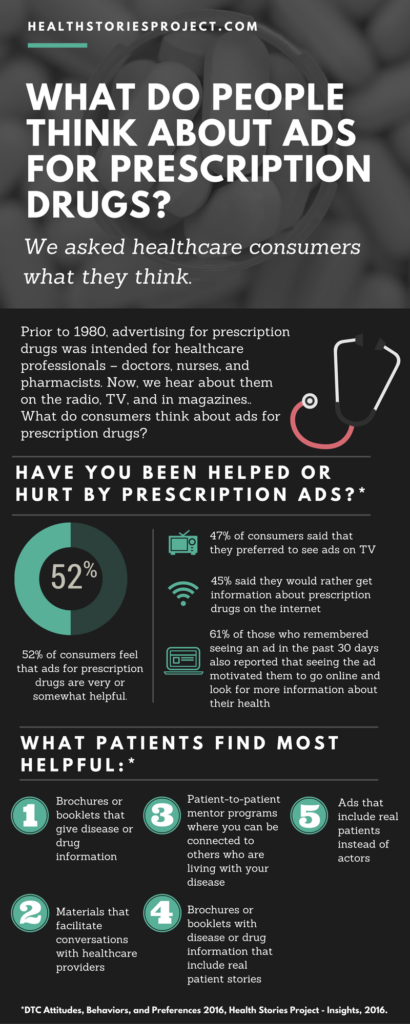Before the 1980’s, advertising for prescription drugs was intended for healthcare professionals – doctors, nurses, and pharmacists. During the 80’s, though, print ads started to appear in publications that everyone read. The FDA responded by publishing industry guidelines for ads, and the floodgates opened! Suddenly we were hearing about prescription drugs on the radio, seeing ads on TV, and reading multi-page ads in magazines.
Why did pharmaceutical companies change their marketing strategies, and what has the impact been on patients? Why has the AMA called for a ban on ads for prescription drugs? Most importantly, what do patients think about prescription drug advertising?
We did some research into these questions and conducted a study with real patients to see what they think. Here’s what we found:
Why do pharmaceutical companies advertise?
Pharmaceutical Research and manufacturers of America (PhRMA) represents America’s leading pharmaceutical research and biotechnology companies. In a document that outlines industry-adopted principles governing consumer-directed ads for prescription drugs, they identified five ways that ads serve the interests of patients:
- Increasing awareness about diseases;
- Educating patients about treatment options;
- Motivating patients to contact their physicians and engage in a dialogue about health concerns;
- Increasing the likelihood that patients will receive appropriate care for conditions that are frequently under-diagnosed and under-treated; and
- Encouraging compliance with prescription drug treatment regimens.
How do doctors see it?
Doctors don’t necessarily disagree that ads benefit patients in some ways, but in a press release distributed in November of 2015, the AMA called for a ban on advertising, stating:
“Today’s vote in support of an advertising ban reflects concerns among physicians about the negative impact of commercially-driven promotions, and the role that marketing costs play in fueling escalating drug prices,” said AMA Board Chair-elect Patrice A. Harris, M.D., M.A. “Direct-to-consumer advertising also inflates demand for new and more expensive drugs, even when these drugs may not be appropriate.”
The AMA identified other factors that are driving up the cost of treatment, but they are more complex to understand and control. In comparison, a ban on advertising sounds easy and effective.
So, what do consumers think about ads for prescription drugs?
Have you been helped or hurt by advertising?



*DTC Attitudes, Behaviors, and Preferences 2016, Health Stories Project – Insights, 2016.
Health Stories Project recently completed an online survey* asking healthcare consumers to tell us what they think. Here are some of the key results:
52% of consumers feel that ads for prescription drugs are very or somewhat helpful
61% of consumers who remembered seeing an ad in the past 30 days also reported that seeing the ad motivated them to go online and look for more information about their health
47% of consumers said that they preferred to see ads on TV; 45% said they would rather get information about prescription drugs on the internet
We also asked survey participants to rate a range of patient-focused programs and services that are often sponsored by pharmaceutical companies. The five choices consumers found most helpful* were:
- Brochures or booklets that give disease or drug information
- Materials that facilitate conversations with healthcare providers
- Patient-to-patient mentor programs where you can be connected to others who are living with your disease
- Brochures or booklets with disease or drug information that include real patient stories
- Ads that include real patients instead of actors
Here at Health Stories Project, we felt very validated by these results! It seems clear that not only do consumers value health information, but that learning about the experiences of people who are living with disease can be just as important as having the facts about the risks and benefits of treatment options.
So, if you feel motivated to share a story about how your life has been impacted by a health issue, you get a double benefit: the feeling of resolution that often comes from placing your experience into the context of a story, and the opportunity to help someone who is dealing with health issues of their own.

